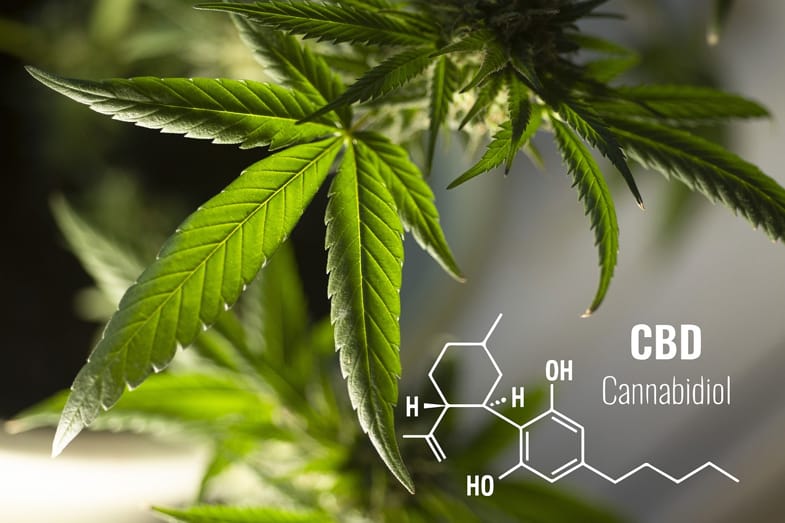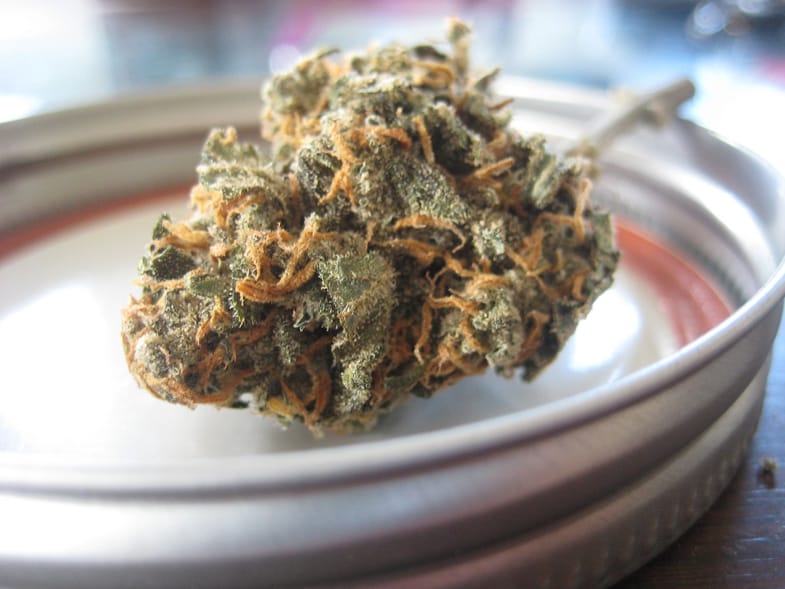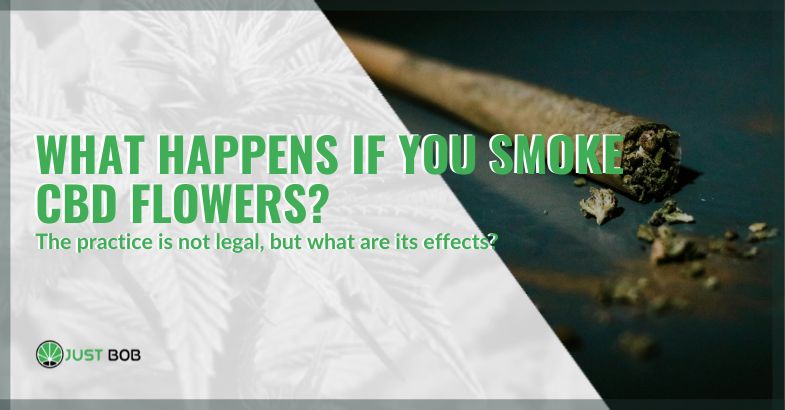Modified on: 10/12/2024
The practice is not legal, but what are its effects?
In this article, we will look at what happens if you smoke CBD (cannabidiol), its side effects and the risks you run.
Many people wonder if it is legal to take cannabidiol and question what CBD actually is. Above all, we will try to explore the effects of it, how it acts on the body and the brain system. We will also turn our spotlight on the uses of cannabinoids in the therapeutic sphere, always bearing in mind that they may only be taken with a doctor’s prescription.
Here on Justbob we will try to understand the effects of CBD, why inhaling it through combustion can be harmful and what the consequences on the lungs can be.
Finally, if you will be patient enough to follow us in this quick excursus, we will list other ways besides smoking that may be less impactful on the body such as the application of oils.
Read also: Guide to the most popular strains in the world of weed
The legal status of CBD in the UK
CBD oil is legal in UK but must be authorised by the Foods Standards Agency (FSA) and its THC concentration must not exceed 0.2%.
Yes, because from 2019 CBD products are considered novel food and therefore controlled and authorised by the FSA, while the production of industrial hemp is regulated by the Misuse of Drugs Act.
Still taking into account this limitation on THC quantities, CBD oil, cosmetics, drugs and food products are legal. But this matter is continuously in transition, so one has to keep up-to-date to make sure one is always acting in compliance with national and international laws.
On the other hand, as far as CBD flowers are concerned, their consumption is always forbidden, but their purchase lives in a kind of grey area.
On the one hand, as reported by the Volteface Pleasant Lands, the law prohibits growers from extracting CBD from the leaves and flowers of the cannabis plant, allowing them to use only seeds and stems, considered by insiders to be the least valuable part of the crop.
However a ruling by the Court of Appeal in June 2023 called this prohibition into question.


CBD in society
According to a recent survey by the Cannabinoid Industry Association approximately 20% of Britons have used at least once in their life CBD products.
THC, the active ingredient in cannabis, is banned in the UK for recreational purposes, as it is considered a narcotic because it is psychoactive, but permitted for therapeutic purposes if prescribed by a medical professional.
The Office for National Statistics reports that 16% of young people between the ages of 16 and 24 have taken CBD in the last year and 7.4% of adults over the age of 24.
Marijuana is the most widely used psychoactive substance in the UK but the numbers of regular users is decreasing from 30 years ago.
Medical cannabis: the current situation
Medicinal cannabis is legal in the UK as of 2018 but NHS doctors do not prescribe it easily, so many citizens turn to private doctors.
According to a survey, as many as 84% of Britons do not know that it is legal to use cannabis for medical purposes.
Currently, according to a newspaper survey, there are 1.8 million citizens who treat themselves with CBD on their own without medical advice, precisely because of the difficulty of getting these drugs prescribed.
These people self-diagnose disorders and syndromes (perhaps with the help of Dr. Google!) and self-prescribe medicines or take marijuana for medical purposes without any specialised advice, risking negative and unpredictable side effects.
It seems clear that this trend is risky for health and only generates so much uncertainty in public opinion.
Certain political resistance to the use of cannabis for therapeutic purposes is difficult to understand; it is often a matter of prejudice, not of rational, documented decisions.
The WHO has declared how this substance can be useful medically and many authoritative studies have demonstrated the positive anti-inflammatory and pain-relieving effects of marijuana in suffering patients.
Our politics change very quickly and each side has different ideas and interests in this regard, so one must pay attention and keep up-to-date. This regulatory chaos, allow us to observe, generates not a little confusion among citizens.
The effects of CBD: risks and benefits
CBD has recognised and important beneficial effects, it can be a valuable ally in alleviating various ailments such as:
- insomnia;
- anxiety and mental/physical stress;
- chronic pain;
- headaches;
- menstrual pain.
In addition, CBD has other remarkable properties
- analgesic and anti-inflammatory;
- neuroprotective;
- antiemetic;
- energising and anti-oxidant characteristics;
- anxiolytic;
- antipsychotics;
- anticonvulsants.
Cannabidiol sends signals to receptors of the endocannabinoid system and in this way is able to influence very important physiological functions relating to appetite, pain perception, the sleep cycle and mood regulation.
However, there are also possible undesirable side effects, albeit rare and mild, such as:
- dry mouth;
- arterial hypotension;
- diarrhoea;
- lack of appetite;
- mood swings;
- dizziness and drowsiness.
These negative effects can occur especially in the case of interferences with other drugs, which is why we will never tire of repeating and reiterating: take CBD for medical purposes, only and exclusively after a doctor’s prescription and under the supervision of your specialist.
What can happen if you smoke CBD?
But let’s get to the point at last. If you have landed on these pages, you are certainly curious about the effects that smoking CBD can have on your organism.
Even if we are talking about CBD with THC levels of less than 0.2%, the practice is still illegal. Therefore, everything we are going to explain will only be for information purposes to satisfy your curiosity about this increasingly debated topic.
Of course, we do not in any way want to encourage you to use substances that are not legal, just the opposite; we think that choosing based on correct data and clear information is always better than choosing based only on fear or prejudice.
So, let’s not linger any longer: what happens if you smoke CBD?
Smoking CBD can have a soothing and relaxing effect but these effects may vary from person to person.
Some have reported having had negative experiences probably because they were auto-suggestive or self-conditioned, because they were already in a situation of emotional frailty or they took CBD in an unfriendly environment in which they did not feel comfortable.
The CBD, it should be remembered, has no psycho-active or psychotropic effect, so any negative experiences reported from this point of view are the result of self-suggestion, which is not to be disregarded anyway.
But how does CBD act on our brain system?
Precisely, cannabidiol acts on the amygdala and the anterior and posterior cingulate of our brain, promoting the reduction of anxiety, emotional tension and fearful stimuli.
It would appear that CBD, when smoked, may have smoothing and relaxing effects superior to other modes of intake. In fact, it would help soothe complex emotional states and distress, promoting a positive mental state.


What are the risks of smoking CBD?
First of all, let’s be clear, combustion is not at all healthy for the human body.
There is carbon monoxide, tar and other harmful toxins in the smoke, which is why it should definitely be avoided if you care about your health.
In addition to a health-related fact, smoking CBD proves to be a non-rational and ineffective choice, as during the burning process most of the cannabinoids are destroyed by heat.
So not only are we putting harmful substances into our bodies, but we are also only taking in a small part of the cannabidiol, the rest being lost in combustion.
Recent research has found that during the combustion of cannabis, 88% of harmful substances are created that have nothing to do with various cannabinoids, such as carbon monoxide, polycyclic aromatic hydrocarbons and tar.
Precisely for this reason, in countries where it is legal, many consumers tend to prefer vaporizers.
Why is it that despite the negative effects some people persist in preferring smoking to other modes?
It is quickly said: with smoking, CBD directly enters the bloodstream through the lungs.
This exchange in gaseous form between the lung alveoli proves to be fast and effective.
Thus, the effects of cannabidiol are immediately perceptible to the smoker.
This mode of intake allows a higher absorption rate than other modes such as ingestion or local application.
Some, on the other hand, smoke CBD to stop smoking tobacco; this practice would reduce the need for nicotine, but this is still being investigated by addiction researchers.
The medical and scientific community is unanimous in denouncing the negative effects of smoking on the lungs. Specifically, as published by the Centers for Disease Control and Prevention (CDCP), smoking causes lung damage, increases the chances of contracting enfema, bronchitis and pneumonia, affects mucus production and causes even chronic coughing.
Read also: CBD Oil for Pets: A Perspective on the Emerging Trends, Benefits, and Risks
In conclusion
Here we have come to the end of our journey to discover the effects of smoking CBD.
We have taken a quick look at the legal status of CBD in the United Kingdom, bearing in mind how the legal and regulatory issue is still debated and in progress.
Smoking CBD inflorescence is not legal in the UK but a ruling by the Court of Appeal in June 2023 seems to have called into question the relevant legislation, so best to keep an eye out and not take anything for granted.
This situation of regulatory chaos seems really confusing and we understand how it can create great uncertainty for citizens.
Takeaways
- CBD products such as oils, cosmetics, drugs, and food items are legal in the UK if authorized by the Foods Standards Agency (FSA) and with a THC concentration not exceeding 0.2%. However, the legality of CBD flowers remains uncertain due to ongoing legal debates and recent rulings.
- Despite legal ambiguities, approximately 20% of Britons have tried CBD products, with a notable percentage of young people and adults using CBD for various purposes. However, public awareness regarding the legal status and medical applications of cannabis remains relatively low.
- While medicinal cannabis is legal in the UK since 2018, access to it through NHS channels remains limited, leading many individuals to seek alternative routes for treatment. A significant portion of CBD users resort to self-medication without medical supervision, highlighting the challenges in accessing appropriate healthcare.
- CBD offers various potential health benefits, including alleviating insomnia, anxiety, chronic pain, and other conditions. However, it’s essential to acknowledge potential side effects such as dry mouth, hypotension, and dizziness, especially when CBD interacts with other medications.
- Smoking CBD poses health risks due to the inhalation of harmful substances present in smoke, including carbon monoxide and tar. Moreover, the combustion process may degrade cannabinoids, reducing their effectiveness. Despite these drawbacks, some individuals prefer smoking CBD for its rapid absorption and immediate effects, though alternative methods like vaporization offer safer alternatives.
FAQ
What happens if you smoke CBD?
Smoking CBD can have a soothing and relaxing effect, although experiences may vary from person to person. It’s important to note that CBD has no psychoactive or psychotropic effects, so any negative experiences reported are likely the result of self-suggestion. Cannabidiol acts on the amygdala and the anterior and posterior cingulate of the brain, promoting the reduction of anxiety, emotional tension, and fearful stimuli. However, combustion is not healthy for the human body, and smoking CBD can introduce harmful substances like carbon monoxide and tar into the lungs.
What are the risks of smoking CBD?
The risks of smoking CBD include exposure to harmful substances found in smoke such as carbon monoxide, tar, and other toxins. Additionally, combustion destroys most of the cannabinoids, resulting in inefficiency in delivering cannabidiol to the body. Research has shown that smoking cannabis can create harmful substances unrelated to cannabinoids, which can damage the lungs and increase the risk of respiratory issues.
Why do some people prefer smoking CBD despite the negative effects?
Some people prefer smoking CBD because it allows cannabidiol to enter the bloodstream quickly and effectively through the lungs. This rapid absorption leads to immediate effects. However, it’s important to note that smoking CBD is not a rational or healthy choice due to the harmful effects of smoke on the lungs. Some individuals may also smoke CBD to reduce nicotine cravings, although this practice is still being studied by researchers.









